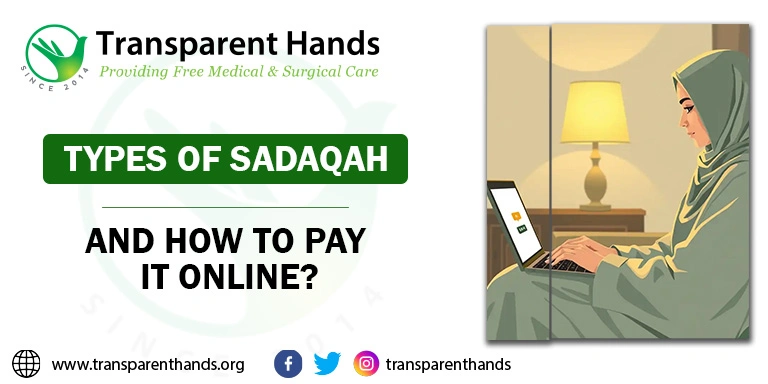Types of Sadaqah and How to Pay it Online?

Sadaqah is one of the most important practices in Islam. Not only does it let believers earn great spiritual rewards, but it also helps them become better human beings. Sadaqah is not limited to monetary donations. Therefore, it encourages maximum participation from believers regardless of their financial situation. In this article, we will explore the importance of Sadaqah, types of Sadaqah, and the spiritual rewards it promises to givers.
What is Sadaqah?
Sadaqah originates from the Arabic word ‘Sidq’, meaning sincerity. It is a voluntary form of charity given with a sincere intention and without expecting anything in return. Sadaqah can be monetary or non-monetary. Monetary Sadaqah may include cash, clothing, food, medical assistance, or any other material form of support provided to the needy. Non-monetary Sadaqah includes acts of kindness such as smiling at someone, offering sincere advice, teaching, sharing knowledge, helping someone carry their burden, visiting the sick, or facilitating reconciliation between feuding parties. While the monetary form of Sadaqah helps the needy, nonmonetary Sadaqah helps improve lives and morality.
Give Sadaqah for Spiritual Purification
Types of Sadaqah
Monetary Sadaqah is a financial contribution that may include cash, food, clothing, medical aid, or any other form of assistance to orphans, widows, the needy, or those facing difficult circumstances.
There are many Qur’anic verses and Hadith that encourage believers to spend in the way of Allah (SWT). In the following Quranic verses, Allah (SWT) promises multiple rewards and blessings for believers who are generous with their wealth:
“The example of those who spend their wealth in the way of Allah is like a seed [of grain] which grows seven spikes; in each spike is a hundred grains. And Allah multiplies [His reward] for whom He wills. And Allah is all-Encompassing and Knowing.” (Surat Al-Baqarah, 2:261)
Non-monetary acts of Sadaqah include simple acts of kindness. Smiling at someone, offering good counsel, teaching valuable skills, sharing beneficial knowledge, helping someone carry their belongings, visiting the sick, removing harmful objects from a path, facilitating reconciliation between people, praying for others, and even speaking kindly to others are all considered Sadaqah.
The Messenger of Allah (ﷺ) said: “Every joint of a person must perform a charity each day that the sun rises: to judge justly between two people is a charity. To help a man with his mount, lifting him onto it or hoisting up his belongings onto it, is a charity. And the good word is a charity. And every step that you take towards the prayer is a charity, and removing a harmful object from the road is a charity.” [Al-Bukhari] [Muslim] Hadith 26, 40 Hadith an-Nawawi
Sadaqah Jariya
For believers, this life is a test, and what comes after is eternal. The Quran clearly states that in the following verse:
“And this worldly life is not but diversion and amusement. And indeed, the home of the Hereafter – that is the [eternal] life, if only they knew.” (Surat Al-`Ankabūt, 29:64)
In another verse, the Quran emphasizes the inevitability of death:
“Every soul will taste death, and you will only be given your [full] compensation on the Day of Resurrection. So he who is drawn away from the Fire and admitted to Paradise has attained [his desire]. And what is the life of this world except the enjoyment of delusion.” (Surat ‘Āli `Imrān, 3:185)
While death ends a person’s tests, it also ends their opportunity to gain spiritual rewards.
However, Sadaqah Jariya keeps that window open. According to a Hadith:
The Prophet (ﷺ) said: “When a man dies, all his good deeds come to an end except three: Ongoing charity (Sadaqah Jariyah), beneficial knowledge, and a righteous son who prays for him.” (Sunan an-Nasa’I, 3651)
Therefore, Sadaqah Jariya is a compelling way of reaping rewards, long after one’s death. One can earn Sadaqah Jariya by:
- Building mosques
- Building Schools
- Developing Clean Water Sources
- Plating Trees
- Donating Copies of the Quran
- Supporting Orphans
- Teaching Valuable Skills
Sadaqah Wajibah and its Types
While Zakat is also considered to be Sadaqah Wajibah, some of the other types of Sadaqah Wajibah are as follows:
Sadaqah Fitr: Fitrana or Sadaqah Fitr must be given before the start of the Eid prayers. It purifies the acts of worship done during Ramadan while helping deserving people celebrate Eid.
Nadhr: Conditional charity that must be upheld in case a believer makes a promise to Allah (SWT).
Fidya: Although fasting during Ramadan is obligatory on all Muslims, people with poor health are allowed to skip their fasts and pay Fidya. For each missed fast, the amount of Fidya must cover the cost of feeding a deserving person, or two deserving persons for either Iftar or Sahur.
Kaffarah: Kaffarah is expiation or atonement that believers must pay to admit and repent from their sins. Different amounts of Kaffarah must be paid depending on the nature and gravity of the situation.
Udhiyyah: Udhiyyah or Qurbani is an animal sacrifice that Muslims make each year on the occasion of Eid al-Adha to commemorate the steadfastness of Hazrat Ibrahim’s (AS) faith.
Your Sadaqah Donations Bring Hope.
How to Pay Your Sadaqah Online to Transparent Hands
Paying Sadaqah has never been easier. Now you can make your Sadaqah donation online quickly and securely through Transparent Hand’s website. Our site provides information about patients who can benefit from your support and generosity.
Transparent Hands is an online crowdfunding platform offering medical and surgical care to deserving Pakistanis. Since 2014, we have treated over 250,000 needy patients. Transparent Hands is Sharia-compliant, and we gather Zakat, Sadaqah, and other donations following our Sharia advisor’s guidance. We also host medical camps in low-income areas to reach those most in need. With your Zakat, Sadaqah, and donations, we can keep spreading hope and providing treatment to those in need. Give your Sadaqah to Transparent Hands today.
Conclusion:
Sadaqah can be both monetary and non-monetary. While the Quran encourages believers to spend in the way of Allah (SWT), believers are also encouraged to practice kindness in their daily lives. Sadaqah Jariya is another important form of Sadaqah that allows the giver to continue reaping spiritual rewards even after their death. Sadaqah Wajiba is a broader term for charity, encompassing Sadaqah Fitr, Nadhr, Fidya, Kaffarah, and Udhiyyah.
You can conveniently pay Sadaqah through Transparent Hand, where you get complete information about the patients you support. Give your Zakat, Sadaqah, and other donations to Transparent Hand now.











Leave a Reply